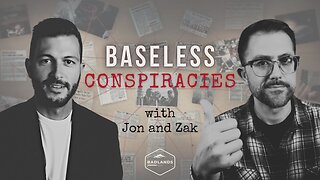Premium Only Content

New Study | Drinking MORE COFFEE can Reduce the Risk of Alzheimer's Disease
This is a review of a study I read out of the Edith Cowan University where a long-term study has revealed drinking higher amounts of coffee may make you less likely to develop Alzheimer's disease.
DoNotAge.org 10% Discount Code: MYNMN (https://bit.ly/2VBDgNt)
Renue by Science 10% Discount Code: MYNMN (https://bit.ly/350ahYM)
I hope you enjoy my content and find it interesting or informative, hopefully both, if so, please consider supporting the channel by signing up to the one you prefer:
*Buy me a Kofi: https://ko-fi.com/mynmnexperiment
*Patreon: https://bit.ly/3hhfjl5
*Subscribestar: https://bit.ly/3psYo23
My Current Anti-Aging Protocol:
• 1.5 grams of NMN
• 1.5 grams of Trans-resveratrol
• 1.5 grams of Berberine
• 2 grams of TM
• 5,000 IU (International Units) of vitamin D3
• 120 mcg (micrograms) of vitamin K2 (Mk 7)
• 250mg Magnesium (L-Threonate)
• 200mg high molecular weight hyaluronic acid
• 2,400mg of Fisetin a day, but only on the 1st, 2nd and 3rd of each month
• 2,400mg of Quercetin a day, but only on the 1st, 2nd and 3rd of each month
https://www.ncbi.nlm.nih.gov/pmc/articles/PMC5420628/
https://www.ecu.edu.au/newsroom/articles/research/latte-lovers-rejoice-coffee-could-lower-risk-of-alzheimers-diseas
https://medicaldialogues.in/neurology-neurosurgery/news/study-reveals-drinking-coffee-could-lower-risk-of-alzheimers-disease-84929#:~:text=A%20new%20study%20has%20revealed%20that%20drinking%20higher,key%20factor%20in%20the%20development%20of%20Alzheimer%27s%20disease.
As part of the Australian Imaging, Biomarkers and Lifestyle Study of aging, researchers from Edith Cowan University in Perth Western Australia investigated whether coffee intake affected the rate of cognitive decline of more than 200 Australians over a decade.
Lead investigator Dr. Samantha Gardener a Post-Doctoral Research Fellow at Edith Cowan University said: “Results showed an association between coffee and several important markers related to Alzheimer's disease.
We found participants with no memory impairments and with higher coffee consumption at the start of the study had lower risk of transitioning to mild cognitive impairment, which often precedes Alzheimer's disease, or developing Alzheimer's disease over the course of the study."
Drinking more coffee gave positive results in relation to certain domains of cognitive function, specifically executive function which includes planning, self-control, and attention.
Higher coffee intake also seemed to be linked to slowing the accumulation of the amyloid protein in the brain, a key factor in the development of Alzheimer's disease.
Dr. Samantha Gardener PhD said that “Although further research was needed, the study was encouraging as it indicated drinking coffee could be an easy way to help delay the onset of Alzheimer's disease. It's a simple thing that people can change. It could be particularly useful for people who are at risk of cognitive decline but haven't developed any symptoms. We might be able to develop some clear guidelines people can follow in middle age and hopefully it could then have a lasting effect."
If you only allow yourself one cup of coffee a day, the study indicates you might be better off treating yourself to an extra cup, although a maximum number of cups per day that provided a beneficial effect was not able to be established from the current study.
In Alzheimer's disease, the amyloid clumps together forming plaques which are toxic to the brain. The study was unable to differentiate between caffeinated and de-caffeinated coffee, nor the benefits or consequences of how it was prepared (brewing method, the presence of milk and/or sugar etc.).
"Crude caffeine" is the by-product of de-caffeinating coffee and has been shown to be as effective in partially preventing memory impairment in mice, while other coffee components, have also been seen to affect cognitive impairment in animals in various studies.
So, this study says if you drink one, going up to 2 may well help
A quick search on Microsoft Bing came up with this from the FDA and the Mayo clinic - 400 milligrams a day seems to be the agreed limit, the FDA say that’s about 4 or 5 cups and the Mayo Clinic say that’s roughly 4, of course there are so many variables when it comes to brew strength and cup size it would be difficult to state a single number when it comes to how many cups a day.
DISCLAIMER: This video and description contain discount codes, which means that if you use the code, I will receive a small commission.
FAIR-USE COPYRIGHT DISCLAIMER
Copyright Disclaimer Under Section 107 of the Copyright Act 1976, allowance is made for "fair use" for purposes such as criticism, commenting, news reporting, teaching, scholarship, and research. Fair use is a use permitted by copyright statute that might otherwise be infringing. Non-profit, educational, or personal use tips the balance in favor of fair use.
#CAFFEINE #COFFEE #DECAF
-
 8:03
8:03
My Longevity Experiment
7 months ago10 Forms of this Longevity Supplement, are you Taking the Wrong One?
1401 -
 37:59
37:59
BibleUnbound
19 hours agoThe Complete Story of John: The Apostle | How to Love Like Christ
12.2K7 -
 56:22
56:22
Vedic compatability astrology
14 hours ago"From Death to Divine: My Awakening, Healing & Soul Path Revealed"
14.9K2 -
 8:54
8:54
VSOGunChannel
14 hours ago $3.24 earnedBREAKING: Anti Gun Activist Megan Bennett Removed from ATF
48.7K16 -
 12:38
12:38
China Uncensored
16 hours agoTaiwan is DONE With China
44.9K50 -
 22:03
22:03
SantaSurfing
13 hours ago4/21/2025 - Pope is gone! How the world is changing for the good! Trump bring religion back!
37.5K37 -
 1:01:30
1:01:30
Trumpet Daily
20 hours ago $9.04 earnedEurope’s Religious Revival - Trumpet Daily | Apr. 21. 2025
37K6 -
 34:52
34:52
Steph & Kayls
16 hours ago $1.34 earnedToys In The Bedroom: Fun, Fantasy, or Too Far? | Ep. 3
18.6K9 -
 2:03:22
2:03:22
Badlands Media
18 hours agoBaseless Conspiracies Ep. 129: Vatican Black Ops, Red Shoes, and the Financial Empire of the Popes
194K55 -
 2:39:38
2:39:38
TimcastIRL
12 hours agoMS-13 Story BURNS Democrats, Media PANICS Tries To Get Off Immigration Story | Timcast IRL
262K1.14K